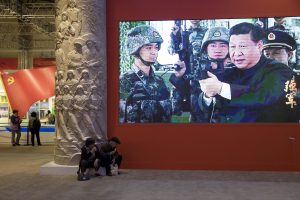During the 19th National Congress of the Chinese Communist Party (CCP), Chinese President Xi Jinping revealed his grand strategic vision for the country’s development – the idea of the “Chinese dream” as the “great rejuvenation of the Chinese nation.” The vision, which embodies a nationalistic consciousness of “historical greatness” exclusive to the “Chinese nation,” has augmented the abrasive nationalism in China’s international conflicts, which are expected to grow more frequent. The adoption of nationalism as the nation’s driving ideology may have bolstered the legitimacy of the CCP, but it has also become increasingly problematic for creating a peaceful environment for the rising power with numerous border disputes, both on land and at sea. China sporadically clashed with Japan over the Senkaku (or Diaoyu) Islands, and with the Philippines, Vietnam, and other Southeast Asian countries over the South China Sea.
China’s latest major border conflict is with India at the Galwan Valley in the Himalayas. The military personnel of the two sides brawled with fists, rocks, and nail-embedded clubs. India suffered 20 deaths, according to a statement from the Indian Army. Indian media reports China’s casualties at between 35 and 43; China, however, chose not to disclose the number of casualties. For nationalist purposes, China could report a lower number of casualties or simply remain silent if the numbers might undermine the people’s faith in the capabilities of the People’s Liberation Army (PLA). A source close to the PLA told the South China Morning Post that all casualty numbers had to be approved by Xi himself.
The silence on casualty numbers coupled with the attempt to downplay the incident demonstrates the pragmatism of the Chinese leadership in de-escalating tensions – but also highlights the growing risk posed by sensitive nationalist sentiments among Chinese citizens. The saying “China is not afraid” saw frequent usage in official pronouncements, and the authorities have endeavored to uphold this impression in domestic propaganda.
What renders the border dispute at the Himalayas more sensitive is that small-scale conflicts between India and China are frequent. It is also because, as hinted or expressed by Chinese experts in Singapore, Britain, and India, China has a feeling of superiority over India, which arguably creates less tolerance for the “Middle Kingdom” to be offended by India. In contrast with the belligerent language directed against U.S. officials like Secretary of State Mike Pompeo, Chinese officials have used relatively moderate language when commenting on the current conflict with India. Global Times editor Hu Xijin, a weather vane for the Chinese government’s position, wrote on Twitter and Weibo that “the Chinese side doesn’t want people of the two countries to compare the casualties number so to avoid stoking public mood. This is goodwill from Beijing.”
Chinese authorities have called for peace and tranquility, which runs antithetical to the Chinese population’s expectations of the “wolf warrior” approach — often expressed through the movie tagline of “Whoever attacks China will be punished no matter how far away”(犯我中华者虽远必诛) in Chinese social media discussions.
While an agreement has been reached on both sides to de-escalate the crisis and “ensure peace and tranquility,” India’s Prime Minister Narendra Modi, as a beneficiary of Indian nationalism equally sensitive to frictions with China, seems incapable of curbing the furious Indian populace from taking the streets to protest and boycott Chinese goods. Indian media outlets have also provided instructions on how to remove Chinese apps from cellphones. The event bears an uncanny resemblance to China’s past experiences with Japan and South Korea. In 2012, Chinese swarmed the streets and overturned Japanese cars to protest against Japan’s claims to the Senkaku Islands. In the dispute with South Korea over the THAAD deployment in 2017, young Chinese schoolchildren were urged to join rallies and boycotts against South Korea; Korean business investment in China decreased significantly after the frictions.
Such incidents raise the issue of the sustainability of the Chinese authorities’ current control over its nationalism. Will China be able to continue mobilizing public sentiments for regime support while strategically curbing nationalism from interfering in foreign relations? In the words of Harvard professor Joseph Nye, “only China can contain China.” China is surrounded by powers such as Japan, Russia, and India that have grown uneasy with China’s rise, and its nationalism has instilled the perception that the realization of the “Chinese Dream” may not be in the best interest of these neighbors. China has shown wariness with India siding closer with the United States after the border clash. Yet nationalist sentiments continue to be fanned by posts mocking of India on both domestic and international social media platforms.
Nationalistic skirmishes online have become more prevalent even between China and neighbors with no border disputes – these countries are expected to view China favorably due to trade and investment ties, and Chinese netizens are quick to take offense at perceived “ingratitude.” Such was the case in the “milk tea war” with Thailand, which prompted the Chinese embassy to respond after users from Thailand, Hong Kong, and Taiwan joined forces to battle China’s narratives. In another case, an article suggesting that “Kazakhstan is eager to return to China” prompted Kazakhstan’s Foreign Ministry to summon the Chinese ambassador; 153 accounts were deleted for over 200 articles on different countries trying to “return to China.”

































